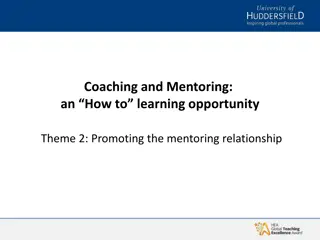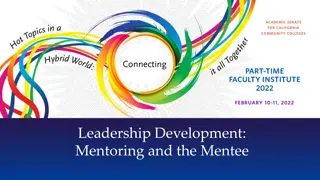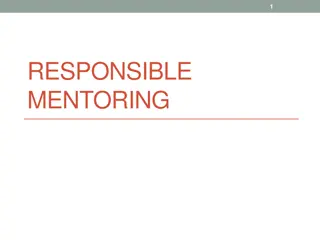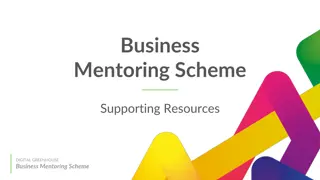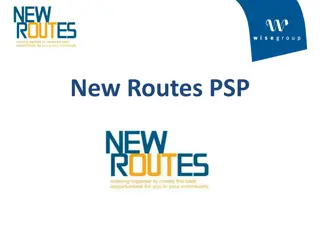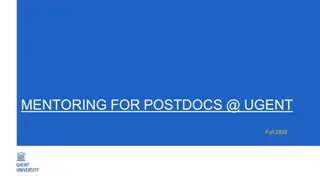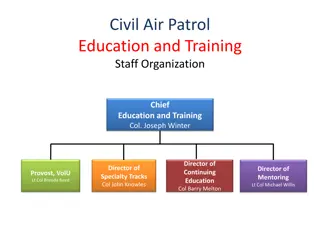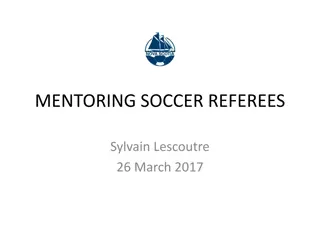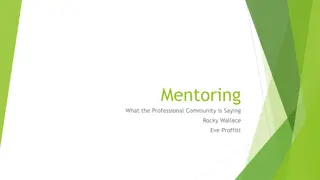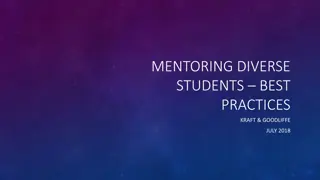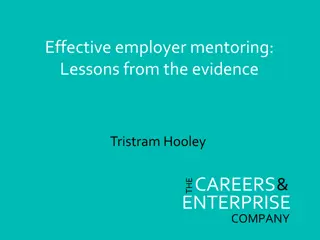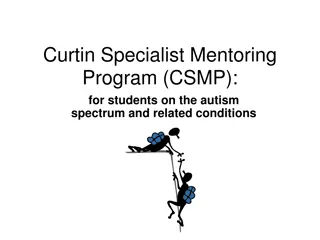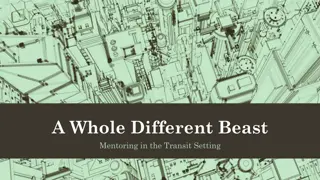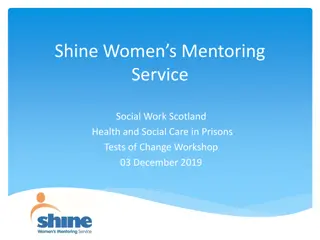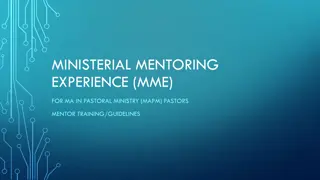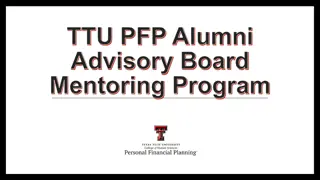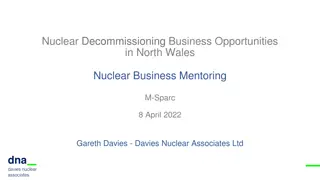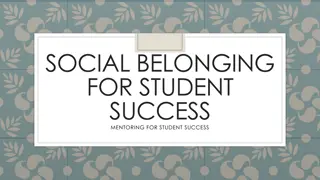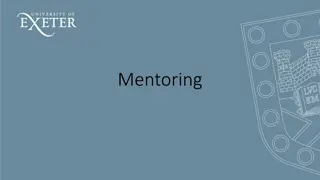Establishing Productive Mentoring Relationships
Develop skills to identify mentors, maintain relationships, and enhance networking. Learn about mentor roles, triumphs, and tragedies, as well as programming for successful mentoring. Dive into mentor-mentee dynamics and effective communication strategies.
Download Presentation

Please find below an Image/Link to download the presentation.
The content on the website is provided AS IS for your information and personal use only. It may not be sold, licensed, or shared on other websites without obtaining consent from the author.If you encounter any issues during the download, it is possible that the publisher has removed the file from their server.
You are allowed to download the files provided on this website for personal or commercial use, subject to the condition that they are used lawfully. All files are the property of their respective owners.
The content on the website is provided AS IS for your information and personal use only. It may not be sold, licensed, or shared on other websites without obtaining consent from the author.
E N D
Presentation Transcript
Learning objectives 1. Be able to establish and maintain a productive mentoring relationship 2. Develop skills to identify and connect with mentors and strategic leaders 3. Polish your elevator speech and the ask
Mentoring & Networking You are the Expert Emelia J. Benjamin, MD, ScM No industry relationships to disclose 1R01HL092577 1R01HL102214 N01-HC 25195 1 P50 HL120163 01
What is a mentor? Domains Value Role Model Content Personal Strategy Coaching Inspiration Expertise Work-life integration Political management Fostering realistic self-appraisal & independence Advocate in the system Sponsor Networker-in-Chief Connecting to collaborators Booster Cheer-leader
Mentoring Triumphs & Tragedies Break into pairs and describe best & worst experience as a mentor or mentee. What made it work when it worked? Mentor actively listens and is present in the moment when Mentor is approachable Life course phenomenon different styles for different stages in mentee s career What elements were unsuccessful? Mentor is too directive and forcing ideas on mentee Criticism without being constructive Mismatch with regard to context of the relationship No chemistry Mentor doesn t give mentee time What did you learn? Need to be clear about grounds of mentoring relationship Establish peer mentors for mentees
Programming for success Primary mentor(s) Approaching potential mentor Who You Are Who They Are Due diligence Expertise Mentoring record Time Role in field /university Agenda Biosketch or CV Career Goals Elevator speech Objective Theirs & yours
Programming for success Primary mentor(s) Mentee Articulate expectations Agenda Topic, timelines, deliverables Meetings Frequency Length Scheduling Communication preferences Respect mentor s time Confidentiality
Programming for success Primary mentor(s) Mentor Articulate expectations Short vs. long term goals Active listening Full attention Understand speaker's intent Understand feelings Accountability Constructive feedback Respect mentee s time Confidentiality
Programming for success Primary mentor(s) Maintenance Be explicit about expectations Periodic re-evaluation What is/isn t working Independence Separation Reciprocity Professional socialization Institutional orientation Enhanced productivity Professional satisfaction
Is your supervisor your mentor? Downsides How make it work Present vs long-term focus Specific mentoring times Conflict of interest Temptation to Fix Disempower Get it wrong Missed learning Peer jealousy Transparency RE scope Encourage mentor diversity Avoid mini-me Mentees goals Mentor post-supervision Coaching vs. mentoring http://leadership-effect.com/articles/when-the-mentor-is-the-bos/
Programming for success Primary mentor(s) Moving on Life course No fault Graceful Consult with respected person Step by step discussed about how to make it work Have achieved the goal of the relationship Expressing gratitude and how the mentor provided the support that made the next step possible
Developmental Network Map In groups of two discuss for 6 minutes (3 each): What did you learn? Where are the gaps? Strategy to enhance your network map Report out Ahaas
Programming for success Mentor Network Opportunities for Networking National meetings Local meetings Collaborating on projects Through children s school community After presentations Posters Airplane to meeting Anywhere
Programming for success Mentor Network Strategies for Networking Keep an open mind the connection can happen anywhere Mentor introduces Make connection based on place/topic Look up contacts Email before event and create connection; Clarify intention/expectations (be limited) Email afterward to follow up Taxi Walk them to next meeting/office/car Business cards (see Educational Media) NIH bio sketch Informational interview; make them feel good
Programming for success Mentor Network Due Diligence Research Profiles Publications Web of Science Author Finder Google Scholar Grants NIH Reporter (shows grants)
Self- & Peer Mentoring Good Questions to Ask 1. What do you want? 2. How are you responsible for this situation? 3. If you knew you could not fail, what would you do? 4. What are you afraid of? 5. If you knew the answer, what would it be? 6. What is hardest or most challenging about this situation? 7. What positive impacts accrue to you from this action or perspective? 8. What will you say no to in order to say yes ? 9. What do you notice in your body right now? 10.What do you know to be true? 11.How are you getting in your own way? 12.What else? Kathy Kram 2011
Learning Communities Identify one senior leader you admire, who you want to add to your mentoring network. Strategize contacting, scheduling, etc. Role play the first 3 minutes Report back January 27 Update on AFA projects
Mentoring dimensions Formal . . . . . . . .Informal Episodic . . . . . . .Relational Hierarchical . . . Peer Functional . . . . Broad-based Career . . . . . . . .Psychosocial Dyadic . . . . . . . .Network Vicki Parker, PhD 2012



